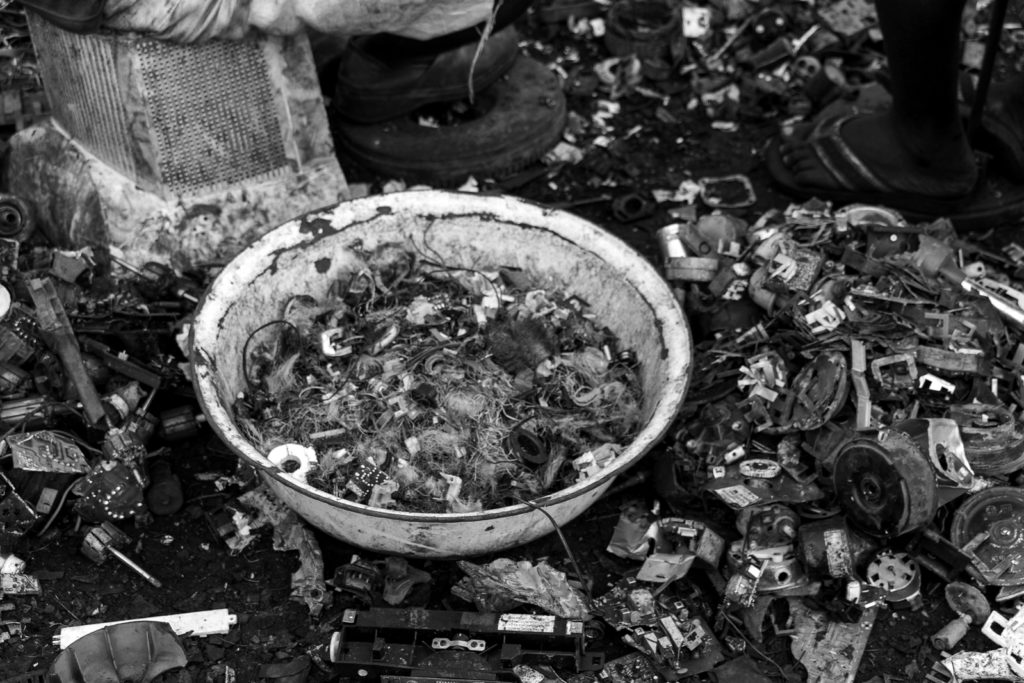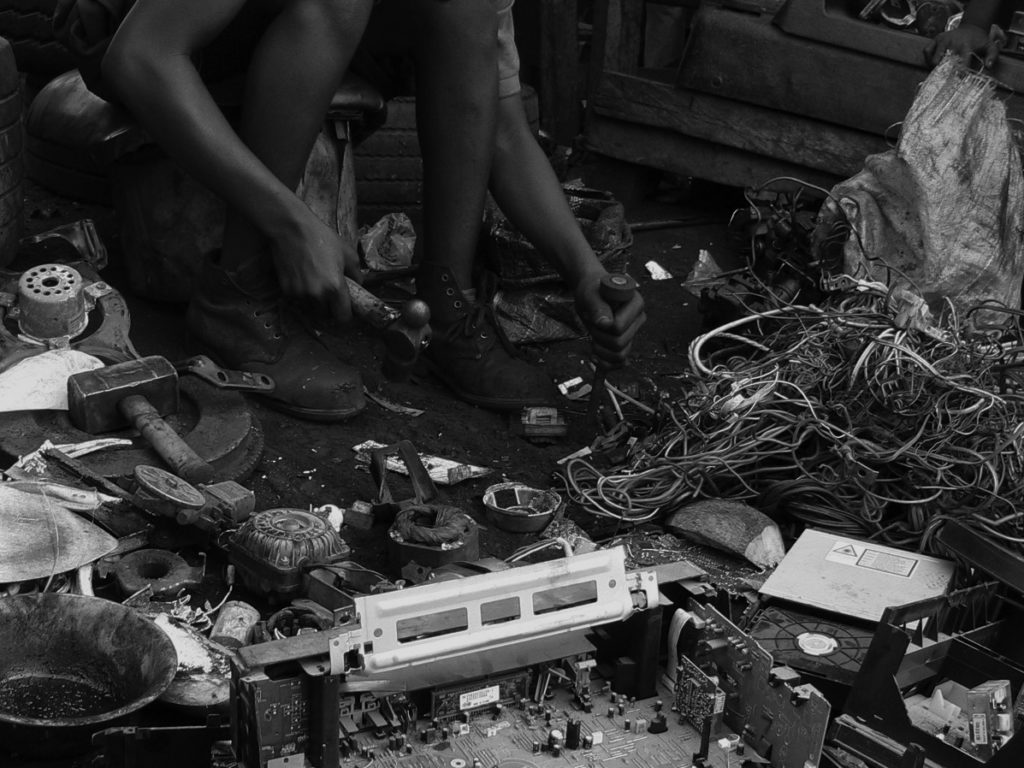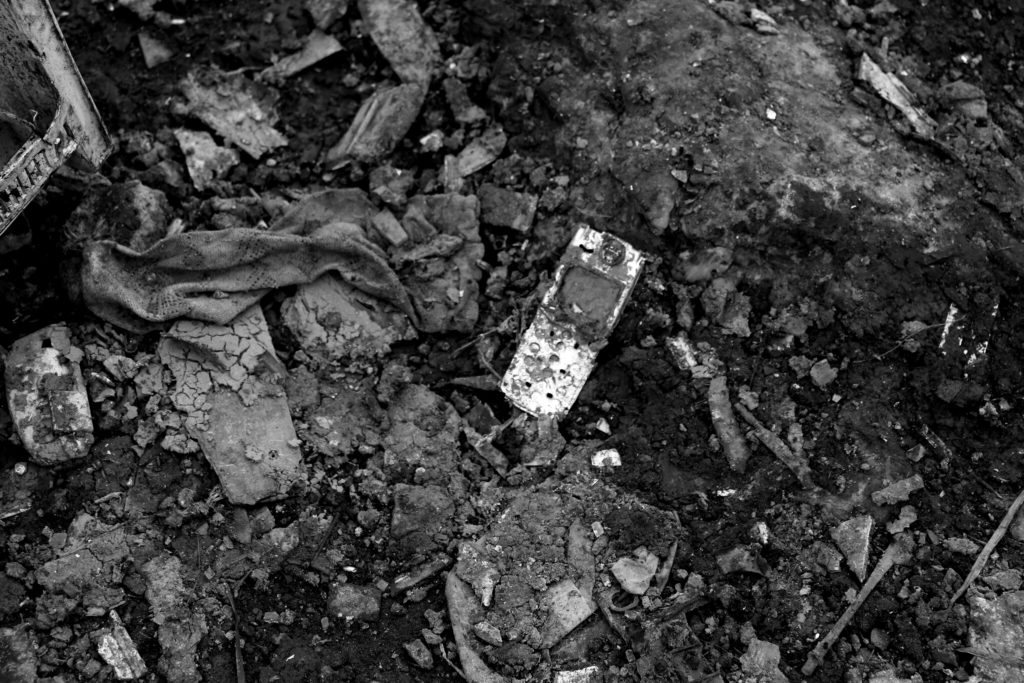
by Aaron Vansintjan
The meal was a bowl of thin soup with a piece of chewy brisket floating in it, served on top of mashed potatoes. These were made from a powder, gelatinous, and barely absorbed the soup. A biscuit was being passed around. Deenah broke off a piece. Before she put it in her mouth she looked at it—she immediately knew this was a bad idea. A small worm was wriggling out of the jagged edge. She closed her eyes and tried not to think about it as she chewed. This wasn’t the first time she’d forced herself to do this—there were so many it would be futile to pick them out—but it still revolted her. Best not to look.
When she finished her meal she felt drowsy and wanted to go to sleep, but she knew she couldn’t. Now they would talk, digest the day. For contractees, this was their only moment of calm in a day filled with work. This evening, Amadeus was telling his story.
I wasn’t born on the water. My family, always been on the land. I grew up in Mogadishu, what was left of it. I had two younger brothers—I don’t know where they are now. I spent my childhood picking chipboards. My father and mother ran an e-waste recycling center out of their home. We would drive to landfills and dumps, and we load in as much as the waste collectors had found. Then we drive them back home, spend most of the time taking apart electronics, harvesting what can be re-used. This we’d sell to traders and mercenaries, and they sell us gas.
Mogadishu was slowly dying, like an LED at low battery. It still had a port, but, boats came less and less often. Mostly, they traded for oil, and they’d buy anything useful that we harvested.
When I was thirteen my father took us to the port. I had found an electronic keyboard, and my father, instead of telling me to take it apart to scavenge the chipboards, let me try to fix it. I got it working after two months. I re-routed the battery pack to our own, and built an adapter to change the voltage. The whole family gathered while I pressed the buttons. One said “Rock ’n’ roll” and a fast beat came on. We all laughed. I then pressed one of the large white keys and a song started playing. When I pressed a different white key, the song changed shape. I opened the back and touched part of the chipboard with a wire. The sounds coming from the keyboard bended and twisted… it was like pulling on a cat’s tail. Everyone laughed.

I knew my parents wanted me to be proud, but they weren’t that impressed. It was just a broken toy keyboard. They had other things on their mind, like how to feed their family. That night I told my parents I wanted to sell the keyboard. So when we got to the port the next day I walked up to the man at the trading shop. He looked at me and said, what’s this?
A keyboard, I said.
I turned it on and played the song. The man stood there glaring at me. He offered two liters of gas for it. Normally we got one barrel of oil for a month’s worth of work.
Later, when we drove away without the keyboard and a Coca-Cola bottle of gas, everyone was silent. My brothers, they were so young but they knew something happened. My father, he didn’t know what to say.
From then on I started learning to help my mother. Together we worked on the garden plot, and she taught me about the different plants and how much water they needed, how some worked well with others, and some had to be planted far away from each other. She showed me how she used a filter system powered by the wind to desalinate water. I often liked to stay home and cook and garden while my brothers went to pick through waste.

When I turned fifteen, a man came to our house. I recognized him from the port, he was the man who bought my keyboard. My parents told us to go play outside.
Later that evening at dinner, my parents asked me if I wanted to work for that man. I would work on a boat, and the money I made would be sent back home and help raise my brothers. I didn’t know this that time, but I think my parents had a lot of debt to him. They said it would only be two years, after, I could come home. I would see the world, be part of a new free trade empire. Learn languages, help the Company grow.
I went with the man. I cried when saying goodbye to my brothers and mother, my father drove me to the port. He was holding back tears. When I said goodbye to him, he told me: Amadeus, you’ll see much of the world, but know that we’ll always be here.
There was silence for a moment at the table. Deenah spoke first.
What then? What happened then?
Well, I never saw my family again. You know what happens. I could tell you stories of my years on one sailing ship, then another, then, finally, this one. Decades of forced work. Cleaning the shit of scavengers and mercenaries. I’ve been a contractee for the Company now, ten years. No more talking tonight. Someone else talk.
This is part of a climate fiction story, From the Craven to the Mains, set 300 years in the future. Read the first piece in the series here.
Aaron Vansintjan is a co-editor at Uneven Earth and is currently pursuing a PhD at Birkbeck, University of London. He writes about gentrification, food politics, environmental justice, and contemporary politics.
This piece is part of Not afraid of the ruins, our series of science fiction and utopian imaginings.